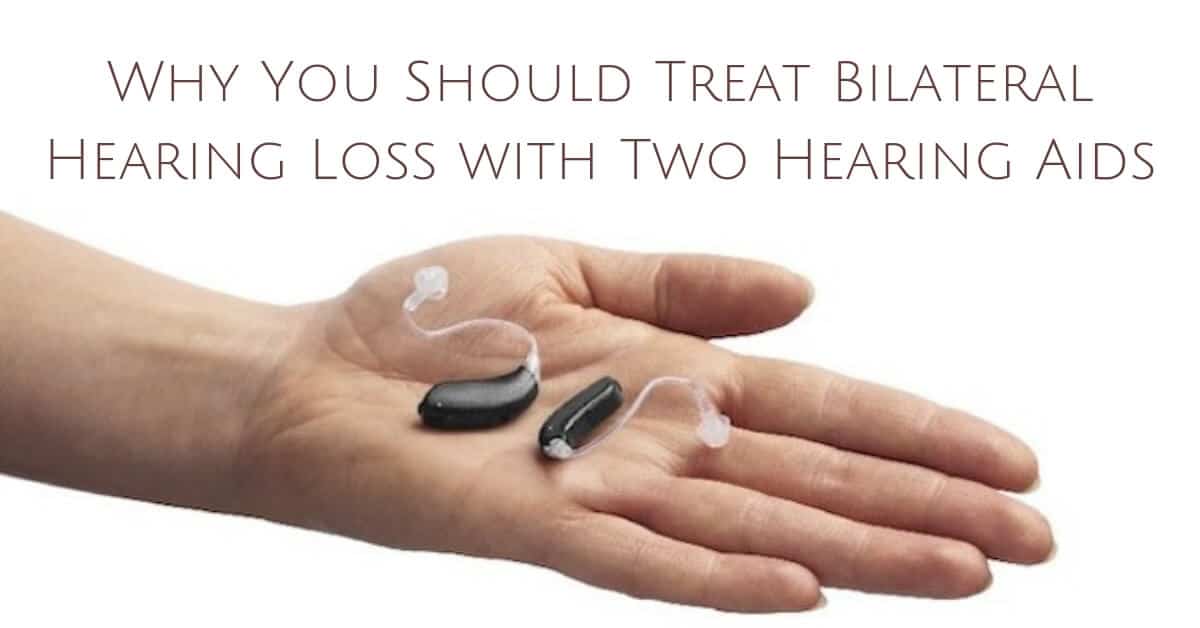
- Common Misconceptions That Delay Hearing Loss Diagnosis - June 6, 2025
- Signs Your Earwax Buildup Needs Professional Attention - May 29, 2025
- Preparing for a Hearing Test and What You Should Bring - May 16, 2025
Humans naturally have what’s known as binaural hearing, which is the ability to hear in two ears. If you ever enjoyed music in surround sound, then you can appreciate the importance of binaural hearing. Often, individuals experience hearing loss in one ear (also known as unilateral hearing loss), yet their health care professionals will recommend getting two hearing aids – one for each ear. Bilateral hearing aid fitting, sometimes called binaural hearing aid fitting, is simply about two hearing aids or assistive devices on two ears.
Why Two?
It’s not uncommon for patients to wonder why they would need two hearing aids when it seems only one ear seems to be the problem. Even if you cannot detect a hearing loss, patients with a noticeable hearing loss in one ear almost always are suffering from a hearing loss in the other as well. To have perfect hearing in one ear while the other one is noticeably impaired is acutely rather rare. Even if one ear hears better than the other, the brain learns to favor it. Using devices in both ears stimulates the brain and helps overcome one ear’s dominance.
Two Ears/ Two Sides of the Brain
When sound enters your left ear, it is processed on the right side of your brain, while the sound that enters your right ear is processed on the left side of your brain. Both brain hemispheres work together to process and interpret the sounds we hear.
Research has found that when you use both sides of your brain to process sound, you often can see a noticeable improvement in your ability to comprehend speech. Your selective listening ability, also known as your ability to favor attention to one voice while ignoring all others, is improved when both hemispheres of your brain are working together. Studies have revealed that when an individual uses two hearing aids, less amplification is required than if they were just using one.
The Importance of Bilateral Hearing Aids
Until recently, when we wore two hearing aids, they worked independently. This meant that each ear was treated like it was the only ear we had. The majority of hearing aids worn today are binaural (two ears), rather than monaural (one ear). There is a range of benefits in using two hearing aids instead of one.
Directional hearing is improved.
With bilateral hearing aids it is easier and quicker to pinpoint the direction sounds are coming from. If you are talking to a group of people, the conversation often shifts rapidly between speakers. Two hearing aids help you quickly locate the person talking. This can keep you more engaged in conversations with your friends and loved ones, continuing to strengthen your personal relationships. Being able to keep up with the conversation will also keep you savvy at work, continuing to keep you relevant as valuable and profiting member of the workforce.
Speech is Easier to Comprehend
People with normal hearing have the ability to separate one conversation from another. With two hearing aids you can listen selectively to the person you are interested in hearing even in noisy and chaotic surroundings.
Your Hearing Aids Work Together
Another perk of bilateral hearing functionality is your ability to adjust both hearing aids by adjusting one. When that hearing aid changes settings, it will tell the other hearing aid to change so that your hearing aids are always in the right setting and working together!
Improved phone conversations
Phone conversations can be difficult when you have hearing loss, particularly in a busy environment. With ear-to-ear functionality of bilateral hearing aids, the phone call is sent to both ears, potentially increasing your ability to follow the conversation and decrease the interference of background noise.
Our two ears are designed to work together. With ear-to-ear functionality, bilateral hearing aids can enhance how your ears are meant to hear!
Explore your Options
To learn more about how you can benefit from hearing aids, contact us at Hearing Aid Specialists of the Central Coast. We can test your hearing and help you find the hearing aids that are best for you.
